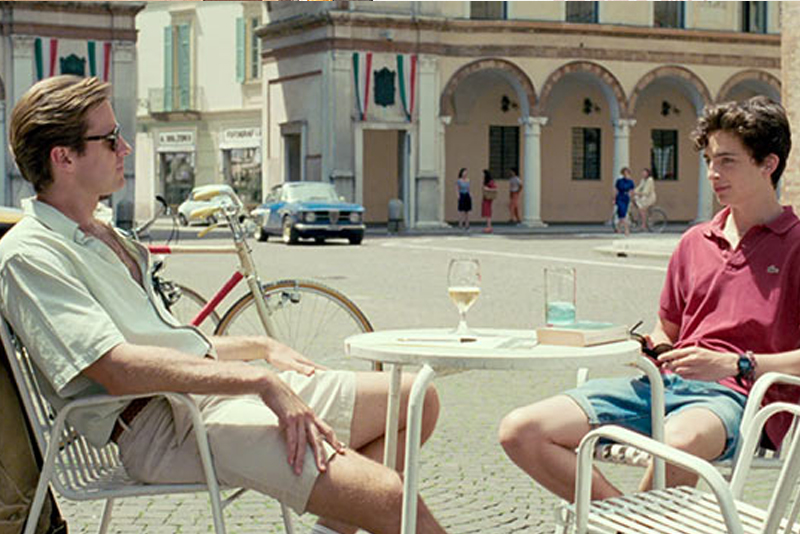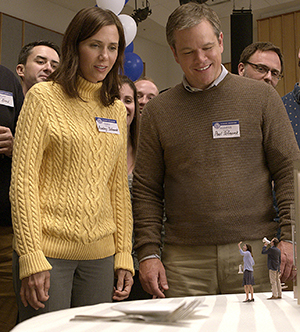Oscar’s Forbidden Fruit

The look of love: Armie Hammer and Timothée Chalamet go waybeyond saying “ciao” in Call Me By Your Name.
Call Me By Your Name, showing exclusively at Ayala Cinemas, benefits from strong performances, particularly Timothée Chalamet and Armie Hammer as slightly age-gapped lovers, and Luca Guadagnino’s take on an André Aciman novel certainly conveys the Merchant/Ivory enchantment of European summers (not surprising, as James Ivory did the screenplay), but dramatically, it’s rather episodic, bringing us slowly into the ever-tightening circle between young Elio (Chalamet), staying with his parents in Northern Italy, and American art researcher Oliver (Hammer), a circle that naturally winds up in a sustained embrace.
Chalamet deserves acclaim for his performance, shifting from pensive gazes to manic dance moves, conveying a young man — though not so young, after all; he’s 17— only now starting to deal with his first real pangs of desire.
Those who grew up watching Merchant/Ivory movies like Maurice will find this familiar territory, and Oscar-nominated Call Me By Your Name certainly ticks off a lot of boxes from that E.M. Forster-loving pair — lots of sunshine-infused gardens, some tender, subtle moments, and a few shots of gushing waterfalls over craggy cliffs to suggest the overwhelming power of nature — but the real power is in the performances, the tension between the two leads, and an unspoken subtext through half the movie.
This is Guadagnino’s third in a trilogy of “forbidden love” movies (following Tilda Swinton in both I Am Love and A Bigger Splash). As usual, his command of Italian locales is perfectly integrated, and it’s a beautiful movie to look at.
The soundtrack nicely weaves in classical music, some piano works by Ryuichi Sakamoto and original songs by breathy singer/songwriter Sufjan Stevens. Michael Stuhlbarg’s speech at the end stretches credulity, or at least wraps up things with a too-precise bow in an era — the ’80s — that was far from this forgiving and tolerant. There’s also a controversial scene involving fruit (as Stephen Colbert put it, “You may never look at a peach in the same way again”), which may or may not make this the arthouse millennial’s version of American Pie. Minus the laughs, of course.
Small world

Let’s get small: Matt Damon and Kristen Wiig contemplate joining the shrunken community to make their dollar go further in Downsizing.
In Alexander Payne’s latest, Downsizing, Paul Safranek (Matt Damon) is about five inches tall. He lives in a mansion the size of a dollhouse that cost him about $2,000 to buy. He underwent a painful process to have himself reduced in size — having all his body hair shaved and dental implants removed — and lives in a special subdivision coated in mosquito netting with thousands of other really tiny people.
How Paul got there is the subject of Payne’s wry science-fiction comedy, showing exclusively at Ayala’s Greenbelt 1 and TriNoma cinemas.
When Norwegian scientist Jørgen Asbjørnsen (Rolf Lassgård) discovers a process to reduce humans to Lilliputian size, the implications for the planet become obvious: if people elect to make themselves smaller, they consume less and the threat of Earth’s overpopulation can be halted. (During a roll-out of the first downsized humans, a scientist proudly displays the total waste output of 36 tiny people over four years: it amounts to one half-filled plastic garbage bag.)
Paul and wife Audrey (Kristen Wiig) halfheartedly sign on to join the downsized community of Leisurelands, a kind of vast suburbia of small mansions and tiny Cheesecake Factory branches. The advantage? Paul’s middling income as an occupational therapist will make him a millionaire in this brave, small new world.
That’s the real appeal of downsizing — not saving the planet by reducing your carbon footprint, but suddenly having the means to live like millionaires. Paul and Audrey learn that their $100,000 savings amounts to $12.5 million once they agree to shrink down. The only thing you have to worry about is mosquitos or attacking birds, or the threat of oblivious human feet trampling you.
Payne’s comedy, co-written with Jim Taylor, highlights society’s pressure to amass enough resources to get by. Of course there are downsides to downsizing: it’s a separate community, away from the big people, and this can be alienating. Downsizing even touches on the Age of Resentment, i.e. The Trump Age, in which “normal-size” people cruelly judge the downsized for not paying their fair share of taxes. “Are you little people even allowed to vote?” taunts one drunk in a bar. “Seems to me you should only get 1/8th of a vote.” It’s a small film with big ideas.
Ultimately, as the premise sets in, it gets even more bonkers. Paul befriends roguish Serbian neighbor Dusan (Christoph Waltz) and his boat captain pal Joris (Udo Kier), and then a Vietnamese protester Ngoc Lan (Hong Chau) whom her government’s forcibly downsized and deported to America stuffed inside a flat-screen TV box with other troublemakers. She’s the only immigrant to survive the TV box journey, but loses a leg in the process. She ends up being a housecleaner in Leisurelands, requesting leftover foods from her relatively rich homeowners which she then disperses among the poorest of the poor on the outskirts of the downsized community. Yes, even in prosperous Leisurelands, there’s a poor side of town. “When you’re middle class and small, you’re rich here,” observes Dusan. “When you’re poor and small, you’re just small.”
Damon does his usual Jimmy Stewart, aw-shucks thing, but it’s Chau who stands out as the Vietnamese refugee, pidgin English accent and all. With shades of The Incredible Shrinking Man, a ’50s sci-fi movie about a guy blasted by radiation particles while sunbathing who finds himself shrinking smaller every day, Downsizing takes on the central issue of how much is enough: how do we spend the planet’s resources, and our own? And how much do our human efforts, whether big or small, amount to?















